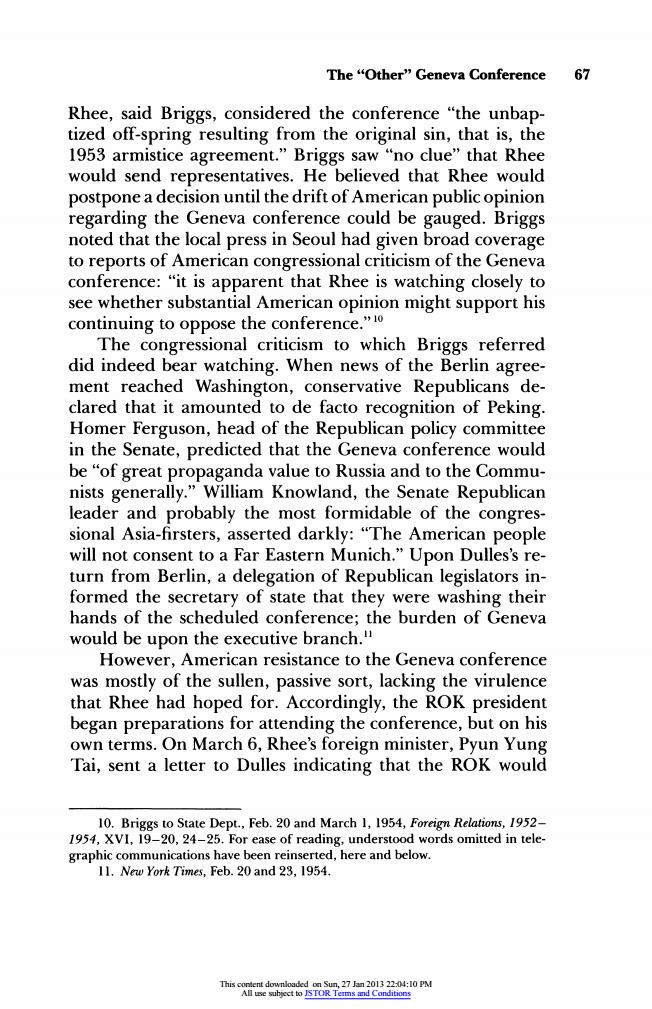正在加载图片...

The“Other'”Geneva Conference 67 Rhee,said Briggs,considered the conference "the unbap- tized off-spring resulting from the original sin,that is,the 1953 armistice agreement."Briggs saw "no clue"that Rhee would send representatives.He believed that Rhee would postpone a decision until the drift of American public opinion regarding the Geneva conference could be gauged.Briggs noted that the local press in Seoul had given broad coverage to reports of American congressional criticism of the Geneva conference:"it is apparent that Rhee is watching closely to see whether substantial American opinion might support his continuing to oppose the conference."10 The congressional criticism to which Briggs referred did indeed bear watching.When news of the Berlin agree- ment reached Washington,conservative Republicans de- clared that it amounted to de facto recognition of Peking. Homer Ferguson,head of the Republican policy committee in the Senate,predicted that the Geneva conference would be "of great propaganda value to Russia and to the Commu- nists generally."William Knowland,the Senate Republican leader and probably the most formidable of the congres- sional Asia-firsters,asserted darkly:"The American people will not consent to a Far Eastern Munich."Upon Dulles's re- turn from Berlin,a delegation of Republican legislators in- formed the secretary of state that they were washing their hands of the scheduled conference;the burden of Geneva would be upon the executive branch." However,American resistance to the Geneva conference was mostly of the sullen,passive sort,lacking the virulence that Rhee had hoped for.Accordingly,the ROK president began preparations for attending the conference,but on his own terms.On March 6,Rhee's foreign minister,Pyun Yung Tai,sent a letter to Dulles indicating that the ROK would 10.Briggs to State Dept.,Feb.20 and March 1,1954,Foreign Relations,1952- 1954,XVI,19-20,24-25.For ease of reading,understood words omitted in tele- graphic communications have been reinserted,here and below. 11.New York Times,Feb.20 and 23,1954. This condent downloaded on Sun,27 Jan 2013 22:04:10 PM All use subpect to JSTOR Terms and ConditionsThe "Other" Geneva Conference 67 Rhee, said Briggs, considered the conference "the unbaptized off-spring resulting from the original sin, that is, the 1953 armistice agreement." Briggs saw "no clue" that Rhee would send representatives. He believed that Rhee would postpone a decision until the drift of American public opinion regarding the Geneva conference could be gauged. Briggs noted that the local press in Seoul had given broad coverage to reports of American congressional criticism of the Geneva conference: "it is apparent that Rhee is watching closely to see whether substantial American opinion might support his continuing to oppose the conference." o The congressional criticism to which Briggs referred did indeed bear watching. When news of the Berlin agreement reached Washington, conservative Republicans declared that it amounted to de facto recognition of Peking. Homer Ferguson, head of the Republican policy committee in the Senate, predicted that the Geneva conference would be "of great propaganda value to Russia and to the Communists generally." William Knowland, the Senate Republican leader and probably the most formidable of the congressional Asia-firsters, asserted darkly: "The American people will not consent to a Far Eastern Munich." Upon Dulles's return from Berlin, a delegation of Republican legislators informed the secretary of state that they were washing their hands of the scheduled conference; the burden of Geneva would be upon the executive branch." However, American resistance to the Geneva conference was mostly of the sullen, passive sort, lacking the virulence that Rhee had hoped for. Accordingly, the ROK president began preparations for attending the conference, but on his own terms. On March 6, Rhee's foreign minister, Pyun Yung Tai, sent a letter to Dulles indicating that the ROK would 10. Briggs to State Dept., Feb. 20 and March 1, 1954, Foreign Relations, 1952- 1954, XVI, 19-20, 24-25. For ease of reading, understood words omitted in telegraphic communications have been reinserted, here and below. 11. New York Times, Feb. 20 and 23, 1954. This content downloaded on Sun, 27 Jan 2013 22:04:10 PM All use subject to JSTOR Terms and Conditions